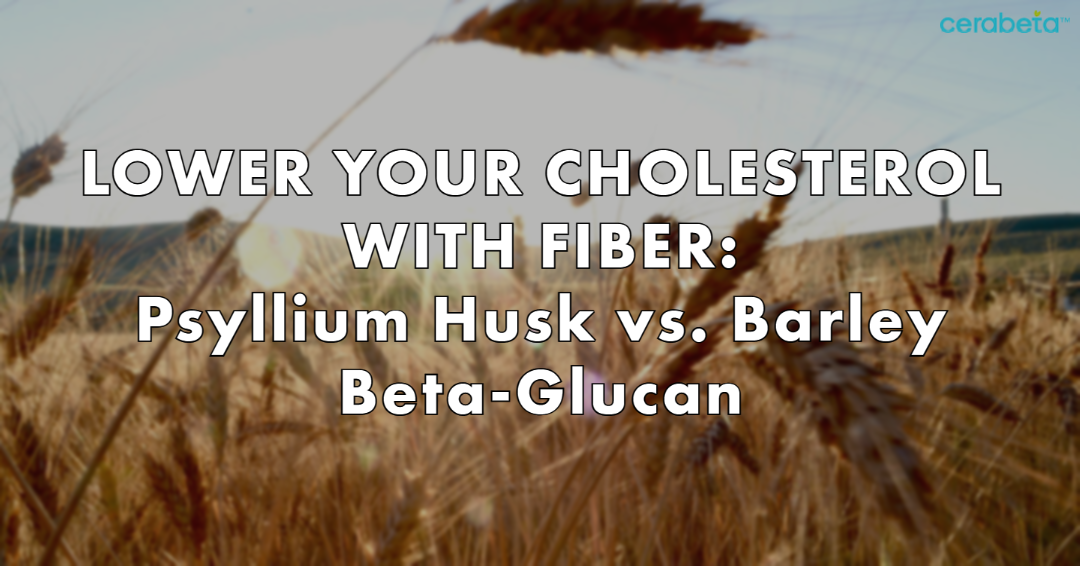Lower Your Cholesterol with Fiber: Psyllium Husk vs. Barley Beta-Glucan

Psyllium husk and barley beta-glucan are two fibers that can help you lower your cholesterol naturally. But what are these fibers?
First of all, beta-glucan is a fiber extracted from barley grains. It has been approved by Health Canada and the FDA to lower cholesterol levels to help you maintain a healthy heart. This natural fibre is gentle on your digestive system and does not possess diverse risks.
Psyllium is a natural fibre obtained from the husk of the herbaceous plant Plantago Ovata, native to the Mediterranean, parts of Asia and North Africa. Psyllium husk is used as supplement to lower cholesterol, and has also been associated with other benefits such as weight reduction (by producing the feeling of fullness and satiety) and relief of irregularity. Despite the potential benefits of psyllium, people taking this fibre must be cautious and aware of the hazards associated with its intake.
Compared to psyllium husk, barley beta-glucan fibre will lower your cholesterol naturally without the risk of esophageal obstruction, possible blockage of your digestive system, and allergic reactions among others.

Esophageal obstruction
Taking this product without adequate fluids may cause it to swell and expand in your throat or esophagus. This may cause choking, especially in the elderly and patients with intestinal issues. You may also have trouble swallowing or breathing. To avoid this, you should mix psyllium husk with plenty of water and consume immediately.

In contrast, barley beta-glucan is safe, dissolves easily in liquids, and does not present a risk of choking. Additionally, you need to take just 3g per day to lower your cholesterol naturally, without worrying about your throat or esophagus getting blocked. Barley beta-glucan does not become super thick when mixed with water. Compared to psyllium husk, this makes beta-glucan much more convenient for people from different age groups and health conditions.
Bezoars
Psyllium fibre can also cause intestinal obstruction if not taken with sufficient water. Psyllium fibre can accumulate in your digestive system, creating a solid and indigestible mass known as phytobezoar (undigestible plant material). The presence of phytobezoars can lead to lack of appetite, abdominal pain, weight loss, nausea, and intestinal bleeding. Once diagnosed, phytobezoars can be removed with surgical procedures or by taking certain medications.

Adenomas
Adenomas are non-cancerous tumours that originate in the thin layer of tissue that covers organs, glands, and other parts of the body. Adenomas must be removed to avoid becoming a cancer risk. One of the most common types of adenomas occurs in the colon and is called polyp.
Individuals with high cholesterol that also have polyps in the colon may want to consider other alternatives to psyllium fibre to lower cholesterol.
A study from the faculty of medicine of Dijon in France determined the effect of intaking 2 grams of calcium, 3.5 grams of psyllium husk, or placebo on adenoma recurrence in patients with history of colorectal adenomas. Out of the 552 patients that completed the treatment, 29.3% developed at least one adenoma as a direct result of taking the psyllium husk. Calcium intake and placebo developed adenomas in 15.9% and 20.2% of the patients respectively. The study concludes that psyllium husk supplements may have adverse effects in adenoma recurrence.

Contrary to psyllium husk adverse effects, studies have shown that fibres from cereals/grains, have the strongest evidence to prevent colorectal cancer. Research in-vivo and in-vitro has shown that Barley Beta-glucan fibre increases the population of beneficial bacteria, enhancing the probiotic performance.
Allergic Reactions
Psyllium has been shown to provoke allergic reactions when inhaled or ingested and, in some cases, could be potentially life-threatening. Symptoms may include moderate to severe wheezing, throat and chest tightness, and urticaria. Psyllium has been reported as occupational allergy (rhinitis and asthma) in health care and pharmaceutical workers, as well as responsible of allergy reactions after ingestion of breakfast cereals added with this fibre. The reason for the hypersensitivity appears to be due to the protein present in the seed.

There are many different products on the market that may help you lower cholesterol, but you should be aware of the risks and side effects associated with its intake before using them.
Psyllium husk is obtained from a natural source; however, reports have clearly shown that this supplement should be used with a lot of caution. In order to have a real lowering cholesterol effect you need to take 7 grams of psyllium fibre daily, which may potentiate risks for the digestive system. If taken without adequate water, it may swell and block your throat and esophagus causing chocking, and it also may affect the natural movement of the gastrointestinal tract.
In contrast, Barley Beta-glucan is a delicate fibre that acts gently on the digestive system. Barley beta-glucan is scientifically proven to maintain a healthy heart by lowering cholesterol and it is approved by Health Canada and FDA. Only 3 grams of barley beta-glucan fibre are needed to have the beneficial lowering cholesterol effect.
Cerabeta is a premium product that contains the right amount of Barley Beta-glucan that you need to lower your cholesterol safely. Unlike other cholesterol reducing alternatives, Cerabeta is 100% natural and leaves you feeling better by improving your digestion, gut health, and helping to reduce your blood sugar levels.
-
This article was written by Nataly López Barón (Ph.D. in Food Science), the Head Food Scientist at Cerabeta and Sunny Boy Foods. Nataly completed her Doctorate of Philosophy at the University of Alberta having extensively studied the effect of plant proteins on in vitro starch digestibility. She is passionate about sharing the positive effects of cereal beta-glucan to help others live better and have healthier lives

Sources:
https://www.canada.ca/en/health-canada/services/food-nutrition/food-labelling/health-claims/assessments/assessment-health-claim-about-barley-products-blood-cholesterol-lowering.html
https://www.accessdata.fda.gov/scripts/cdrh/cfdocs/cfcfr/cfrsearch.cfm?fr=101.81
https://www.canada.ca/en/health-canada/services/food-nutrition/food-labelling/health-claims/assessments/psyllium-products-blood-cholesterol-lowering-nutrition-health-claims-food-labelling.html
https://europepmc.org/article/med/12681118
https://www.hindawi.com/journals/cjgh/2014/501043/
https://www.mayoclinic.org/diseases-conditions/gastroparesis/expert-answers/bezoars/faq-20058050
https://pubmed.ncbi.nlm.nih.gov/29115200/
https://pubmed.ncbi.nlm.nih.gov/11073017/
https://onlinelibrary.wiley.com/doi/full/10.1002/ijc.26381
https://faseb.onlinelibrary.wiley.com/doi/abs/10.1096/fasebj.28.1_supplement.647.45
https://pubmed.ncbi.nlm.nih.gov/24562330/
https://www.annallergy.org/article/S1081-1206(10)61538-4/pdf
https://pubmed.ncbi.nlm.nih.gov/18564629/
https://jamanetwork.com/journals/jama/article-abstract/383985
https://www.sciencedirect.com/science/article/abs/pii/009167499190104V
https://pubmed.ncbi.nlm.nih.gov/7998662/


